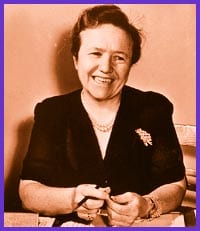In January, the National Archives Of Canada opened the last and most eagerly awaited of Charlotte Whitton’s 134 boxes of personal papers. The discovery of its contents made the outspoken former mayor of Ottawa and child welfare advocate once again the subject of controversy.
Whitton – who was elected mayor in 1952, 1954, 1960 and 1964 and who later served as an alderman until 1972 – wished the box to remain closed until 1999. It contains hundreds of letters written by Whitton over the course of two years to her housemate and companion Margaret Grier. Grier died in 1947.
The box contains a file folder filled with correspondence between the two women, and letters to Grier that appear to be Whitton’s attempt to purge the guilt she felt for being absent on business when Grier died.
It is the nature of these letters which has sparked the controversy, for they reveal an intimate and loving relationship between the two women which spanned the course of 30 years. Charlotte Whitton was a feminist to be sure, but was she also a lesbian?
Often described as “mannish” and “unladylike,” Whitton explained her short hair by saying it was “less trouble in the wind.” In school, she excelled at sports, especially field hockey and basketball. It was while she was studying at Queens University that she had her first and only romance with a man by the name of Bill King. This “courting” was done mostly through correspondence and it appears that King was rather more of a handsome and convenient escort for Whitton, than a serious romantic relationship.
As a feminist, Whitton – who was the first woman to be mayor of a major Canadian city – believed in and fought for equal pay and equal opportunities for women in the public and private sector. However, she did not believe in married women working outside of the home and held very conservative views on abortion and divorce. Her views on sexuality have been described as “prudish.”
Her relationship with Margaret Grier, however, indicates a gentler side.
The two women met in Toronto, where they were both residents at the Kappa Alpha Theta Society house on the campus of the University of Toronto. Whitton accepted a position in 1918 as assistant secretary with the Social Service Council Of Canada, and Grier worked with the juvenile court, the Big Sister’s Association and the Girl Guides.
In Grier, Whitton had found a soulmate, even though the two had very diverse natures. Grier was shy, fair and quiet, with delicate features and a calm spirit. Whitton, younger by four years, was considered intimidating, confrontational, ambitious and egotistical.
In 1922, they moved to Ottawa together in order to advance Whitton’s career. They set up house and lived in a “Bostonian Marriage” type of relationship, a term used in the late nineteenth century to describe relationships between two unmarried women, most likely feminists, who were financially independent of men. This arrangement was socially acceptable at the time, since women sometimes chose a career over marriage, or for whatever reasons found themselves “spinsters.”
The two women had many nicknames for each other, such as “Mardie,” “Putty,” “Pussy,” and “Red Cat” for Grier, while Whitton’s nicknames included “Lawrie,” “Charlie,” “Charles,” “Sharl,” “Lot” and “Rags.” Whitton often wrote poetry to Grier. A sample verse is sure to raise a few queer eyebrows:
So softly your tired head would lie
With gentle heaviness upon my breast
And knowing but each others’ arms
Desiring nothing more we two would rest
They owned a cottage together on McGregor Lake and escaped many a humid Ottawa summer weekend there. One letter written by Grier to Whitton while she was away on business – which was often – seems to sum up the nature of their relationship: “Just two nights gone and I’m so lonesome I could cry whenever I stop to think for a minute – Oh Lawrie, dear, I’m just about crazy all the time you are away from me.”
In letters written to Grier after her death, Whitton bares her soul. She wrote flowery and romantic prose, such as in a letter written on Dec 31, 1947, her first to Grier after her death:
“Oh! Mardie, Mardie, Mardie, how can I go on? Ours wasn’t love, it was a knitting together of mind and spirit; it was something given to few of God.”
In another:
“Mardie, dear. Once again, just you and I together alone tonight veiled from my sight and withheld from my embraces.”
Whitton was upset that Grier had burned a majority of the letters sent her prior to her death, an act that begs the question, why? Was Grier embarrassed or ashamed of the relationship, or just a particularly fastidious housekeeper?
There is also the question as to why Whitton requested the final box of papers sealed for 24 years after her death in 1975. Did she think the late 1990s would be a more accepting time for the contents to be revealed? Or was it out of respect for the reputations of colleagues that she often criticized in her correspondence? Again, we’ll never know the answers.
One thing is clear, however. Whatever the relationship between Charlotte Whitton and Margaret Grier, it was one based on love, admiration, compatibility and respect. Grier’s death was a severe blow to Whitton, and aroused in her profound feelings of loneliness and regret. Whitton felt a strong need to keep Grier as close to her as possible in the years following her death.

 Why you can trust Xtra
Why you can trust Xtra


